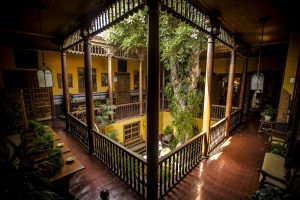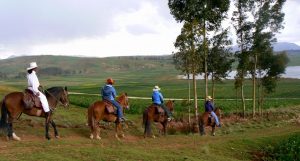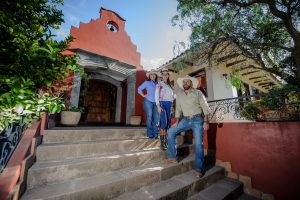Opening up Peru’s Historic Private Homes
Recent travel trends have revealed that travellers are looking to deepen their experiences wherever possible. Peru’s rich cultural history provides the opportunity for this. Forged through the centuries by the many peoples who have made this land home, from the sprawling Inca Empire and pre-Inca civilisations; to the colonial period of European influence; to the waves of immigration from corners of the earth, Peru today is an amalgamation of its past.

While the legacy of the past can be seen in museums, monuments and walking around the city, much of Peru’s story is behind closed doors - in private family homes that have been passed down for generations. With carefully preserved architecture, art and families continuing cultural traditions, these homes are a rare snapshot of Peru’s living history and contemporary culture.
According to Skift research, in 2016 consumers were looking for ‘experiential travel’, ways they could get new and authentic experiences on their trips. 2017 trends are taking that a step further with Vogue and industry leaders explaining that consumers are pursuing ‘transformative travel’. Rather than just experiencing they want to connect with a culture to change their perspective. One way for travellers to accomplish this is to gain access to people willing to open their homes and offer a taste of their daily life. But, on a short trip it can be difficult to authentically interact with the people and experience a country’s cultural history first-hand.
Special Access to Peru’s Private Homes
Marisol Mosquera, the founder of specialist boutique operator Aracari, is opening up her little black book of treasured contacts to create the Private Homes of Peru Collection. From Lima, Cusco or the Sacred Valley, culturally-curious travellers can gain unrivalled access to local life, stepping foot in the homes of some of Peru’s most revered artists, long-standing families and private architectural gems. With ATTA’s ‘Trends Snapshot 2017’ showing that ‘cultural activities’ was the number two activity for South America, Aracari is responding by creating immersive cultural opportunities for guests.
Architectural splendor of Peru’s most magnificent homes
Reportedly the oldest home on the continent, Casa Aliaga dates back to 1527 and has been lived in by the same family for 17 generations. Exemplifying life in the period of Viceroyalty and home to a chapel whose dome is said to be the oldest in Peru, a special tour of the house will offer unrivalled insight into Lima’s history.

Across town, Casa García Alvarado is one of few remaining examples of Republican architecture. Inhabited by the family who built the house in 1912, guests will be hosted for a tour and three-course lunch by Ms. Ana Maria de Astudillo or her daughter.
Just north of Cusco, Hacienda Huayoccari, owned by the Làmbarri family, is a living museum of Peruvian art and artifacts. Dating back to the 17th century, the hacienda houses an extensive collection of pre-Incan, Viceregal and Republican art. Guests will be introduced to a member of the Làmbarri family and explore the grounds via horse on the Huayoccari, Maras and Moray routes.
The legacy of the past is not just physically present in the buildings, but the living culture and traditional ways of life passed down through the generations.
Work, Family Life and Cultural Traditions revealed

Hacienda Sarapampa, a traditional working farm located in the Sacred Valley, offers a window to how corn has formed an integral part of the Peruvian diet and local economy since the Incas. The family-run hacienda has belonged to the Sumar family for over 80 years producing and cultivating giant Cusco corn. Guests are invited for a special tour of the property and to enjoy a traditional meal with the owners and a Peruvian Paso Horse show.
The illustrious Paso breed of horse is a symbol of a Peru gone-by. Get to know the special breed on a day trip to Hacienda Santa Rosa, home to the Navarro Reategui family who has been schooling esteemed Paso horses for decades. Guests will be hosted by the family for a three-course lunch followed by folkloric dancing and a dressage demonstration by the horses. Visits to nearby Hacienda Mamacona, just outside Villa El Salvador can also be organised. It's neo- Republican style is synonymous of nineteenth century Peru and owners, the Rizo Patrón family, educate guests on the significance of the Paso Horse, brought to Peru during the Spanish conquest of the Inca Empire.
Tacama, South America’s oldest and most iconic winery has opened the doors of its traditional hacienda for overnight stays exclusively for Aracari guests. After a day roaming Peru’s largest vineyard and sampling its best vintages, guests can rest their heads in this spectacular family home.
